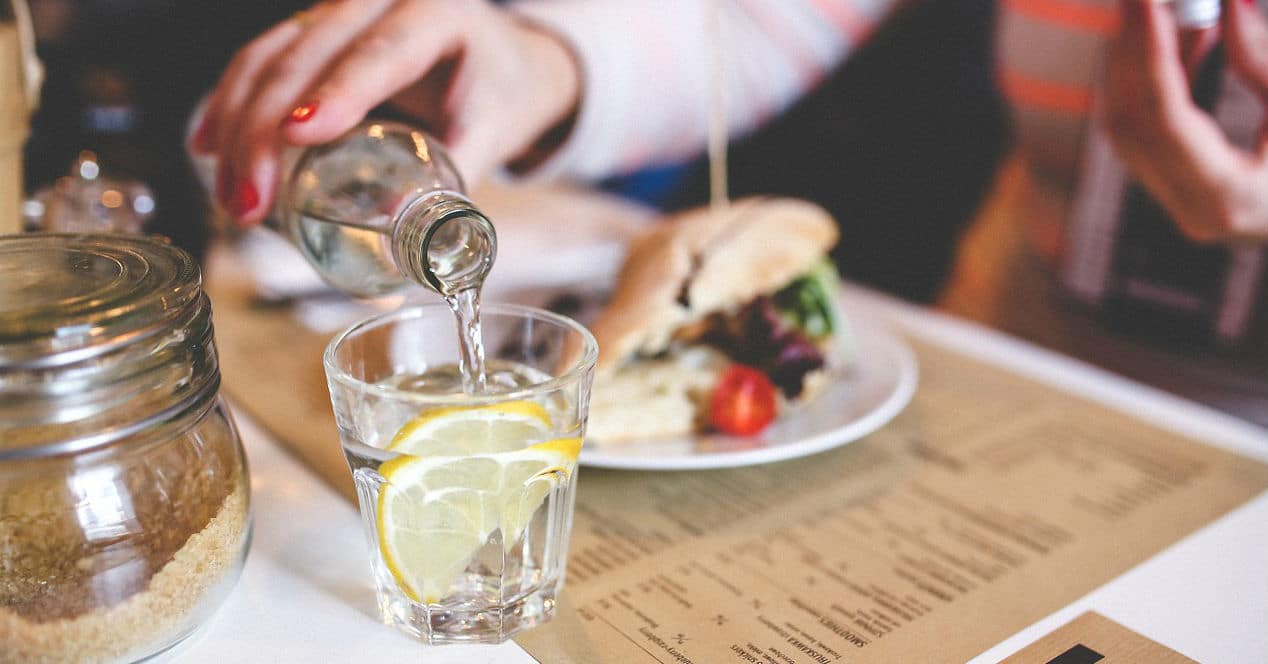
Drinking water is essential to have a proper functioning of the body and to be able to live. We all know that water represents 70% of our composition and that we could last about 7 days without consuming it. It is vital to cleanse the body, keep us hydrated, eliminate toxins and transport micronutrients to the cells.
Being so beneficial for the body, why is there a rumor that drinking water while eating is bad? There are people who think that it gains weight or retains fluids, but is it possible to have 0 calories?
When to drink water?
We would like to emphasize that water (tap or mineral) has zero calories. So she doesn't get fat.
On occasion we have commented that we tend to confuse hunger with thirst, so we should drink water regularly to avoid overeating and reduce anxiety about food. There are studies that affirm that if we drink water before eating, we could eat less food for having "cheated" the stomach. This may or may not be beneficial. If we are in a weight loss phase and feel anxious about eating, drinking water will reduce momentary gluttony; but it can be counterproductive if we need to eat a certain amount of food and you feel a full stomach.
Then there are the rumors that drinking water while we eat, gains weight and retains liquids. We confirm that it is false. When we ingest water, the kidneys are kept working and help maintain a good water balance. Of course, we should not use water to lower food quickly and continue eating more. Chewing correctly facilitates digestion and we will feel satiated sooner.
And of course, water never hinders digestion or significantly interferes with gastric juices. So we have no qualms about drinking water when we sit down to eat, as long as we do it correctly and without haste.
It must be borne in mind that water does not have the same properties as a bottled juice, soft drink or beer. These drinks do interfere with digestion, leading to poorer absorption of nutrients.
Services
Many experts recommend consuming between 2 and 3 liters of water a day, but they do not mean just drinking it. There are many foods with a high water intake, such as fruit and vegetables, so don't be obsessed with filling up on water.
Water helps control your appetite and metabolize fats efficiently. In addition, it is perfect for combating fluid retention and eliminating excess toxins. Remember that you do not need to go on detox diets, your body purifies itself naturally if you keep it well nourished and hydrated.
They improve digestion
Liquids help break down large chunks of food, making it easier for them to slide down the esophagus and into the stomach. They also help move food smoothly, preventing bloating and constipation.
Also, the stomach secretes water, along with gastric acid and digestive enzymes, during digestion. In fact, this water is necessary to promote the proper functioning of these enzymes.
Reduces appetite
Drinking water with meals can also help us pause between bites, giving us a moment to monitor hunger and satiety cues. This can prevent overeating and even help us lose weight.
Additionally, a 12-week study showed that participants who drank 500ml of water before each meal lost 2kg more than those who did not. Research also indicates that drinking water can boost metabolism by approximately 24 calories for every 500ml we consume.
Interestingly, the number of calories burned decreased when the water was warmed to body temperature. This could be due to the fact that the body uses more energy to heat the cold water up to body temperature. Still, the effects of water on metabolism are minor at best and don't apply to everyone. Note that this mainly applies to water, not calorie drinks.
efectos secundarios
Probably one of the most common drinks is the tall glass of water next to the plate of food. Although some people think that it is necessary to drink a glass of water, especially cold water, with meals, this habit could have some health contraindications.
Dilutes gastric juices
The stomach contains digestive acids that aid in the digestion and breakdown of food. Apart from this, these juices are also responsible for killing any infectious agents that might be ingested along with food.
These digestive enzymes are essential to our general well-being, as they also allow the stomach to contract and pulverize the food we eat. When this fire is diluted with water, it not only dulls the entire system but can cause cramps in the intestinal wall in some people. This stagnation of the entire digestive process allows food to stay in the stomach longer and slows down the process of moving digested food into the small intestine for nutrient absorption.
Reduces the amount of saliva
Saliva is the first step for digestion. It not only contains enzymes that help break down food, but also helps stimulate the stomach to release digestive enzymes to prepare for the digestion process.
When we drink water during meals, the saliva is diluted. This not only sends weaker signals to the stomach, but also stops the breakdown of food in the mouth, making it that much harder to digest.
Causes heartburn
If we suffer from constant bouts of heartburn, this habit could be to blame. As drinking water dilutes the digestive system, it leads to a chain reaction of harmful effects.
The stomach continues to absorb water until it is saturated, after that this water begins to dilute the gastric juices; making the mixture much thicker than normal. This leads to less digestive enzymes being secreted, causing undigested food to leak into the system, causing acid reflux and heartburn.

